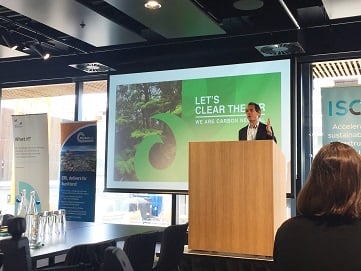
At the #ConnectNZ New Zealand Infrastructure Sustainability Summit earlier this month, The Warehouse Group’s Chief Sustainability Officer, David Benattar painted a confronting portrait of the earth’s future if we don’t get our act together.
Benattar was a keynote speaker at the event held by the Infrastructure Sustainability Council of Australia (ISCA), which focused on three themes: climate, culture and community. He shared how the realities of climate change can no longer be ignored, and how The Warehouse Group is ramping up efforts to drive tangible change.
He used David Wallce-Wells’ book, The Uninhabitable Earth, to illustrate key points around climate change, urging the audience to not read the book if they want to continue business as usual.
“We think of climate change as slow, but it is unnervingly fast. We think of the technological change necessary to avert it as fast-changing, but it is deceptively slow,” Benattar told the audience. “More than 10,000 people die every day globally from the small particle pollution produced by burning carbon. Globally, pollution kills nine million each year. That’s 1.5 holocausts.”
“Barring a reduction of emissions we could see at least four feet of sea-level rise and possibly eight by the end the century. A radical reduction - such as required by the Paris accord - could still produce as much as two meters, or six feet by 2100,” he added.
The conversation wasn’t all doom and gloom though, as Benattar also outlined the positive work The Warehouse Group is doing to address the critical issues society is facing. Benattar shared that The Group has an ambitious emissions reduction programme, with 25 initiatives designed to reduce emissions by 32% by 2030.
Benattar also spoke about how The Group’s commitment to being carbon neutral became reality in February of this year with the announcement of its CarboNZero certification. This move means that 100% of The Group’s 40,000 of carbon emissions have been offset – making it the third retailer in New Zealand and the first large company in Australasia to do so.
Benattar also shared more details around The Group’s substantial emissions offsetting scheme to the audience, which has two key elements.
“The first is carbon credit purchasing from countries where we operate. These aren’t just any carbon credits – they are from certified projects that have both a social and environmental benefits for local communities,” said Benattar. “The other project is back here in New Zealand. We’re working closely with our Trees That Count and Project Crimson partners to regenerate native forestry which benefits Aotearoa’s biodiversity, ecosystems, our communities.”
Benattar reminded the audience that it’s not just The Warehouse stores that are implementing these actions. “You’ll see the programme at Noel Leeming, which already recycles more than 55 tons of polystyrene a year. We also collect and recycle used white ware and sell one of the largest range of energy efficient appliances in New Zealand at those stores.”
It doesn’t stop at the stores either, as Benattar explained how The Group is also looking into more ways to reduce post-consumer waste. Some of these ways include utilising more sustainable packing materials and eliminating plastic bags. “We’ve diverted approximately 120 million plastic bags from landfills since 2012 through our programmes that first charged for bags, then moved to phase them out completely.”
When it comes to the ‘why’ behind these efforts, the answer from Benattar was clear. “It’s because we care. It’s because business needs to care, and it’s because healthy businesses need healthy communities.”




